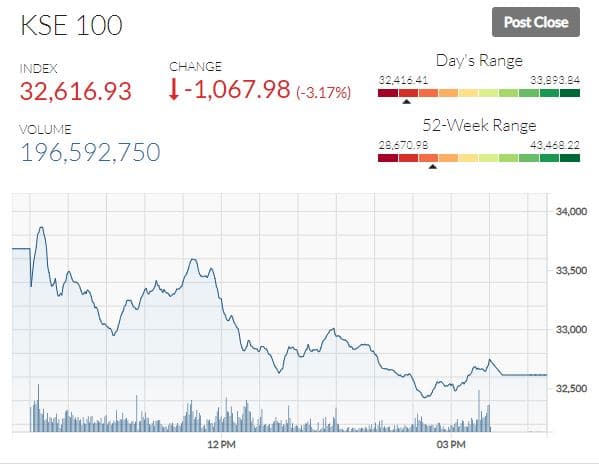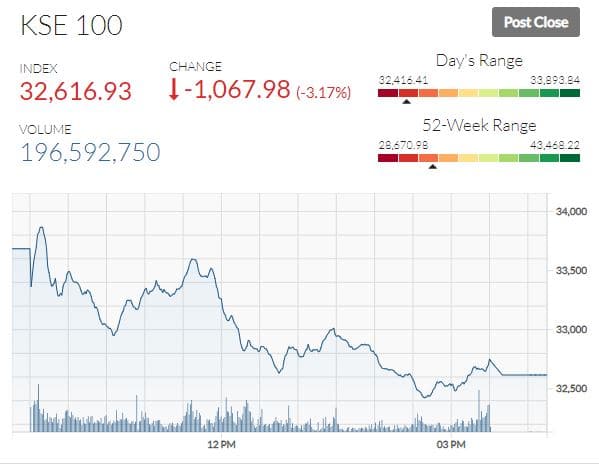Pakistan Stock Exchange continued its bearish trend owing to the impact of the coronavirus outbreak as investors were swamped by extreme uncertainty.
During the last two consecutive sessions, KSE-100 has declined by 3,444 (-9.55%) points which is the highest two-day decline in the history of Pakistan, stated an AHL report.
At the end of the day, the KSE-100 index fell by 3.17% or -1,068 points to close at 32,617. The market rose by 209 points to 33,894 points during the opening minutes of trading but failed to maintain upward momentum as it touched an intraday low of 1,268 points.

Samiullah Tariq, Head of Research at Arif Habib Ltd said that the market is down as a consequence of a decline in regional markets, lower commodity prices, expected slow down in the global economy and negative impact arising from the outbreak of COVID-19.
After today’s session, KSE-100 saw a 20% decline in the ongoing year.
The market remained Yo-Yo in light of new virus cases emerging in Pakistan. The oil stocks continued downward pressure because of falling oil prices. Importantly, fears crept in as some regional markets have been shut. The government statement of requesting a debt write off bodes negative to investors and was unwarranted. Investors are swamped by extreme uncertainty. Risks worth taking in companies likely to benefit from new developments of falling oil prices and monetary easing in a post-Corona world, said A.A.H Soomro, managing director at Khadim Ali Shah Bukhari Securities Pvt.
Mohammad Farooq, a Business and Financial Journalist who oversees global market developments noted that markets across the globe have been experiencing wild swings for the past two weeks. The global economy wasn’t prepared for a seismic shock in the shape of the coronavirus and stocks globally have suffered through uncertainty and unpredictability.
He further added that the Fed’s move to calm markets by lowering interest rates by 1-1.25% to just above zero on Sunday and announcement of renewing large swathe of buying government bonds reminiscent of the Great Recession a decade ago largely failed to provide any reassurance.
He continued:
Also, unlike the Great Recession the window for maneuvering for the Fed in terms of interest rate cuts was very minimal which it exhausted this past Sunday. Emerging markets have been experiencing capital outflows into safe-haven assets like the US dollar which has caused currencies like the Indonesian Rupiah and the Indian Rupee to lose its value. One of the biggest threat that continues to haunt the global economy is the lack of containment and control of the Coronavirus which is causing virtual lock downs across the world and which will hit production and cause a massive nosedive in demand as people remain at their homes. As evidenced by Chinese manufacturing numbers released on Monday, the lockdown caused an unprecedented fall in demand as people there remained fearful of thronging markets in the past month or so causing its collapse.
In all, 240.37 million shares were traded at the exchange. Of the 337 scrips traded, 83 advanced, 237 declined and 17 remained unchanged.
Top Volumes
| SCRIP | PRICE | HIGH | LOW | CHANGE | VOLUME |
|---|---|---|---|---|---|
| BOP | 8.50 | 9.21 | 8.23 | -.6 | 24,610,000 |
| PIOC | 36.37 | 41.5 | 36.37 | -2.94 | 20,079,000 |
| MLCF | 25.34 | 26.55 | 24.1 | -.18 | 15,506,000 |
| HASCOL | 15.60 | 16.95 | 15.46 | -1.1 | 14,029,500 |
| UNITY | 10.64 | 11.75 | 10.36 | -.7 | 10,341,500 |
| FCCL | 15.94 | 16.64 | 15.35 | .04 | 8,855,500 |
| PAEL | 24.40 | 25.5 | 23.5 | -.06 | 6,606,000 |

